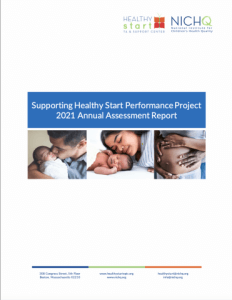United Healthcare Catalyst Initiative: Infant Health Equity
United Healthcare and NICHQ are partnering with Healthy Start grantees and communities to address upstream causes of inequities in maternal and infant health.

Addressing Infant Health Equity
UnitedHealthcare and NICHQ are partnering with Healthy Start grantees and communities to implement community-identified and community-engaged interventions to address upstream causes of inequities in maternal and infant health. The project aims to leverage and strengthen cross-sector partnerships to address factors using a social ecological model (SEM) approach which considers the complex interactions between people and their environments. The project emphasizes the importance of community engagement and partnership, as well as data-driven decision making and evaluation to create a collaborative learning and continuous quality improvement of intervention activities and surfacing of learnings across all program components.
Who
United Healthcare, Healthy Start programs, NICHQ’s Department of Health Equity Innovation, NICHQ’s Department of Applied Research and Evaluation
Our Role
NICHQ brings expertise in authentic community engagement and evaluation to support the implementation of community interventions aimed at addressing inequities in maternal and infant health outcomes.
Funder
United Healthcare
Project Impact
NICHQ’s Department of Applied Research and Evaluation (DARE) partners with UnitedHealthcare (UHC) Catalyst to convene community members to identify and address upstream causes of health care inequities.
Project Impact
NICHQ’s Department of Applied Research and Evaluation (DARE) partners with UnitedHealthcare (UHC) Catalyst to convene community members to identify and address upstream causes of health care inequities.
To date, DARE works with the Northeast Florida Healthy Start Coalition’s Magnolia Project to conduct a formative evaluation to address maternal stress in Jacksonville, FL. DARE developed qualitative and quantitative data collection tools for the Florida team and analyzed the data resulting from these activities, capturing the experiences of about 50 Magnolia Project parents, Community Action Network (CAN) members, and community partner organizations. Findings from the evaluation activities will be used by the Magnolia Project to inform and implement an intervention to reduce maternal stress in the Jacksonville community, including therapeutic programming, mini-grants, community events, and workshops.
External Resources
State Perinatal Quality Collaboratives
List of PQCs funded by the Center for Disease Control and Prevention (CDC)
The Power of PQCs
Video showing the impact that PQCs have on the communities they serve. Produced by the NNPQC.
PQCs in the News
Articles in news outlets covering state PQCs, their activities, and the people that work in the collaboratives.
Patient Safety Bundles
From the Alliance for Innovation on Maternal Health. PSBs are collections of evidence-informed best practices that address clinically specific conditions in pregnant and postpartum people. The NNPQC helps provide TA and support to PQCs in adopting the core AIM Perinatal Mental Health Bundle.
Perinatal Quality Collaboratives
The CDC’s landing page for PQCs, including helpful infographics, videos, and links to help explain what PQCs are, how they work, and stories, learnings, and publications that have come out of the state PQCs.
Related Content
Resources produced by the United Healthcare Catalyst Initiative: Infant Health Equity project or on related topics
Meet Our Team

Becky Russell, MSPH
VP, Applied Research and Evaluation

Stacy Scott, PhD, MPA
VP, Health Equity Innovation

Rebecca Huber, MPP
Senior Analyst

Rinka Murakami, MPH
Analyst

Tatiana Egbuna
Project Manager, Health Equity Innovation


